Ulat Lila 2024: Report on the Situation of Filipino Women
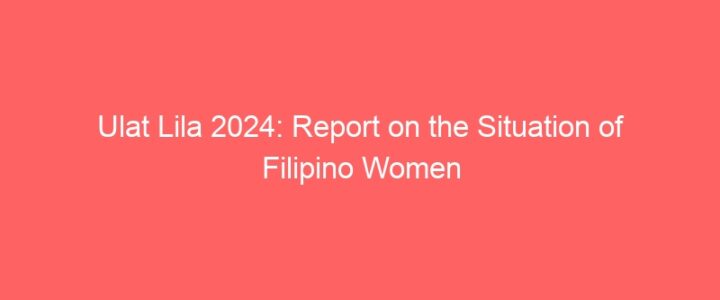

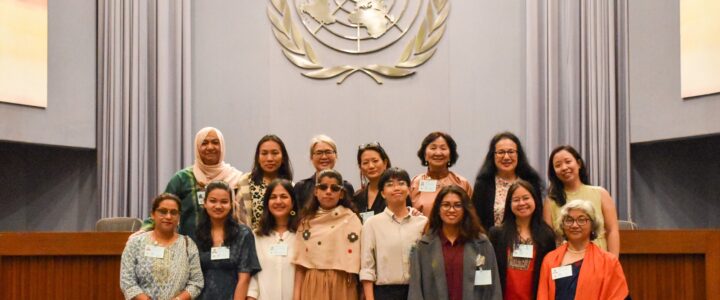
Statement to be delivered by Cielito Perez, Center for Women’s Resources, Philippines
As we sit here discussing the prospects of the Summit of the Future, women in our communities are grappling with depressed wages, insecurity of jobs and livelihoods, rising food and fuel prices, reduced public services on health, education, social protection, and social welfare. Democratic spaces continue to shrink with increased militarism, fundamentalism, and authoritarian patriarchal regimes.
While we appreciate the emphasis on human rights and gender equality in the Pact of the Future, it is more important to move beyond mere rhetoric. We are presented with real problems that need real solutions and actions. Member States must demonstrate resolute commitment to dismantling systemic barriers and injustices by a system that takes away wealth and resources from developing countries to developed countries, and thus, exacerbates inequalities within our countries.
Despite affirmations of commitment to the 2030 Agenda, glaring gaps in financing remain unaddressed. In the Asia-Pacific region alone, USD 1.5 trillion is needed annually, to achieve the SDGs. Yet, half of the region’s developing economies rely on external debt to meet our needs, burdening us with crippling debt repayments. As a result, women bear the brunt of austerity measures imposed on us. Meanwhile, ODAs have been declining in quantity and quality and donor countries are failing to uphold their historical commitment to appropriate 0.7% of their Gross National Income towards development assistance.
We are alarmed by increasing reliance on the private sector to fund the SDGs. The Public Private Partnership approach at different levels, gave more roles to the corporate sector in development policies strengthening corporate capture of our economies. Privatization of essential services and infrastructures widens disparities, depriving and displacing marginalized people.
The Summit also talks about international peace and security, but this will remain elusive as militarism is used to pursue economic and hegemonic interests. There is no peace and inclusive development when military expenditure continues to divert resources away from sustainable development spending. Peace cannot exist when the military-industrial complex profits from wars and conflicts that claim the lives and future of women and children.
We recognize the need to strengthen digital cooperation and harness the potential of science, technology and innovation, and with this, we want a Global Digital Compact that will end the concentration of power in a handful of big digital and tech companies and ensure that technologies will be a tool of development for the most marginalized, and not used to maintain the status quo or reconcentrate much bigger resources and profits in the hands of a few.
In transforming global governance, we are concerned that we are falling short of realizing the vision of a multilateral system that is more effective, more trusted, more inclusive, and better equipped for the challenges, opportunities, and capacities of the present and the future. It is essential to overhaul the global debt architecture, and prioritize climate finance, and human rights. The Summit of the Future must advocate to democratize global economic and financial governance, referencing ongoing processes such as the UN Tax Convention to tackle illicit financial flows and promote fiscal transparency.
While the Summit of the Future presents a crucial opportunity to chart a course toward a more just and equitable world, this can be done if, and only if, we acknowledge that the current system has failed and that a new framework of development is needed. We urge our governments to chart a course towards development justice – an alternative model of development that puts people and planet over profit, centering on and respecting human rights and people’s right to development – a future of global equity, of ecological sustainability, of social justice, and genuine peace.
Thank you very much.
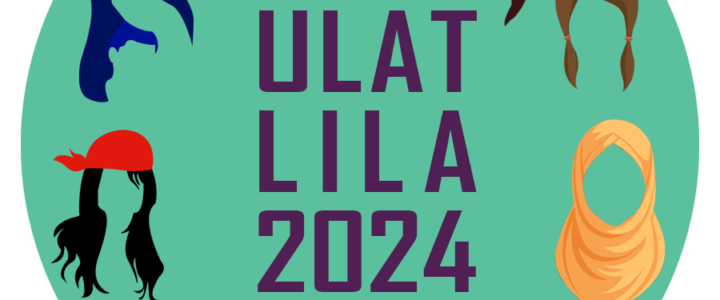
In commemoration of March 8, International Working Women’s Day, CWR | Center for Women’s Resources, in partnership with the UP Diliman Gender Office and Altermidya, will be holding a public forum to present Ulat Lila, its annual report on the situation of Filipino women. For 22 years, Ulat Lila has served as an avenue for researchers, community leaders, advocates, and rights defenders to discuss pressing issues of women from different sectors.Join us on March 1, Friday, 1-5PM at Benitez Theater, College of Education, UP Diliman, Quezon City. You may register at https://forms.gle/mi1kVsiR8HVJgmu56.
#WomensMonth #IWD #DefendFilipinoWomen
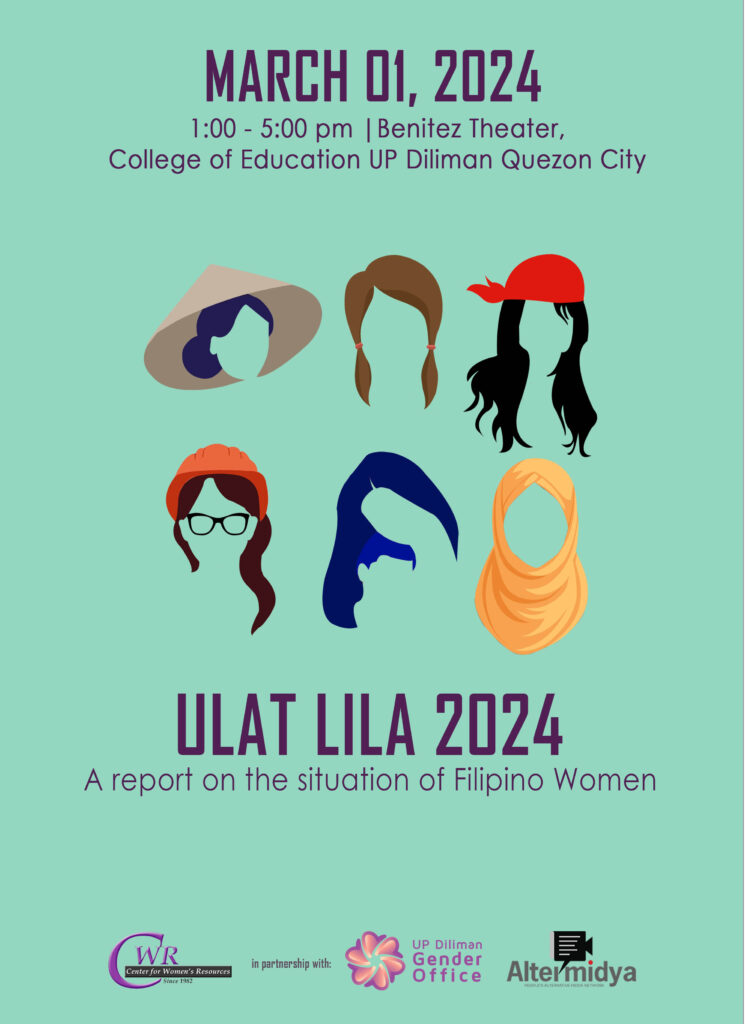
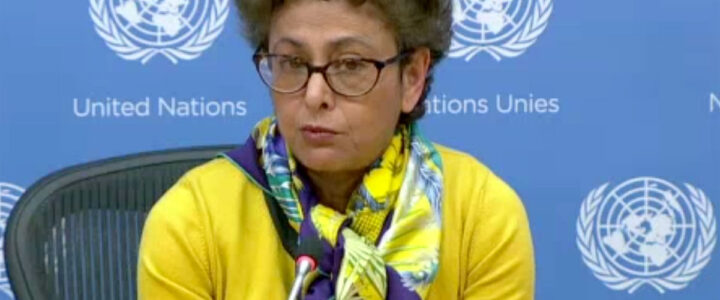
The Center for Women’s Resources welcomes the visit of UN Special Rapporteur Irene Khan to the Philippines. CWR recognizes this as an opportunity to emphasize the need to protect and uphold the right to freedom of opinion and expression for Filipino people, especially of marginalized women and women human rights defenders. These fundamental rights serve as cornerstones in the advancement of women’s development and the safeguarding of women’s human rights within democratic societies.
In the Philippines, women who speak up face significant risks. Even voicing demands for jobs, livelihood, access and control over land and other resources, access to health and education services, can lead to persecution. These women are attacked and harassed for being members and leaders of organizations, associations, and unions that oppose state’s anti-people policies and actions. They face constant surveillance, arbitrary arrests, and unfair trials, all aimed at silencing their voices and undermining their work.
Restrictive laws such as the Anti-Terror Law (ATL), the creation of NTF-ELCAC and the continuing implementation of Executive Order 70 enables and exacerbates the risks faced by women human rights defenders. This stark reality persists despite international and national commitments, including recommendations under the UPR, CEDAW, and SDGs.
In a span of one year, from July 2022 to June 2023, eight (8) women, mostly peasant and rights activists, have fallen victims to political extrajudicial killing. Three women have been forcefully disappeared, including peasant rights advocates Elgene Mungcal and Ma. Elena Pampoza. Illegal arrest on trumped up charges also continues.
According to Karapatan, in July 2022, 13 human rights defenders in the Southern Tagalog region were slapped with charges under the ATL. This includes a 19-year-old woman, Hailey Pecayo, coordinator and paralegal of Tanggol Batangan. Pecayo joined a fact-finding mission to look into the killing of 9-year-old Kyllene Casao by suspected military elements in Taysan, Batangas. Also facing charges under ATL is Jasmin Rubio, secretary-general of Mothers and Children for the Protection of Human Rights.
It is crucial to note that these women human rights defenders are leaders in their respective communities, they are farmers, workers, indigenous people, who have long experienced discrimination and rights violations, and thus know and hold the solution to the current economic and social crisis that we are facing. As key stakeholders, WHRDs are uniquely positioned to advocate for solutions that will ensure women’s democratic rights.
In time for UN SR Irene Khan’s visit to the Philippines, we demand urgent attention and action to address the challenges faced by WHRDs and ensure that women’s voices are not silenced:
1. Address the culture of impunity surrounding attacks on women human rights defenders. Investigate and prosecute perpetrators to ensure accountability and justice.
2. Repeal repressive laws such as the Anti-Terror Law (ATL) that curtail freedom of opinion and expression. Steps must be taken to ensure freedom to hold opinions without interference and to seek, receive and impart information and ideas through any media, and regardless of frontiers, as stipulated in the Universal Declaration of Human Rights. Ensure that laws and policies align with international human rights standards and do not hinder the work of women human rights defenders.
3. Implement comprehensive mechanisms to protect women human rights defenders. Foster an environment that encourages open dialogue and inclusivity, ensuring that women’s voices, particularly those of marginalized groups, are heard and valued in decision-making processes.
As we strive for a society that upholds democracy and justice, we call on the Philippine government to take concrete steps to respect, protect, and promote women’s democratic rights. We hope that UN Special Rapporteur Irene Khan will hear the voices of marginalized sectors and women’s human rights defenders. We hope that she will incorporate their perspectives into her report, which should serve as the foundation for formulating recommendations to strengthen the protection of human rights in the Philippines.
Finally, we call on all Filipino people to remain steadfast in our commitment to pursuing our democratic rights. It is through our collective unity and shared struggles that we can guarantee its realization towards a just and democratic society. #

The Center for Women’s Resources (CWR) supports the proposed legislative measures aimed at increasing women’s participation in political parties (House Bill No. 6604 and House Bill No. 9667). This proposed measure is of critical importance and represents a stride towards empowering women within the political sphere, aligning with principles enshrined in international human rights frameworks.
The right of women to participate in public and political life, including their representation, is vital for fully realizing their role as agents of change and beneficiaries of sustainable development and progress. The meaningful involvement of women in public life is crucial to ensure the integration of their concerns and perspectives in decision-making processes and policy formulation.
Examining the current landscape of women’s political participation in the Philippines reveals a modest increase in women’s representation in elected positions, with the proportion of female elected officials rising from 22% in 2016 to 31% in 2022. Despite an 8.47% increase in the number of women elected officials between the 2016 and 2022 National and Local Elections, the overall proportion fell short of the envisioned 50-50 distribution in decision making positions.
While legal impediments to women’s political representation do not exist, and despite the enactment of the Magna Carta of Women, systemic and cultural barriers persist. The slow growth in women’s political representation is attributed to various challenges, including persistent patriarchal norms and gender stereotypes, domestic responsibilities, and inadequate training and education. Financial constraints and limited economic resources for political campaigns greatly impedes women’s ability to compete on an equal footing with male counterparts.
Instances of violence against women in politics remain a significant concern. Women candidates and politicians face threats, harassment, and discrimination, creating a hostile environment that discourages many from active political engagement. For instance, the Gabriela Women’s Party, the lone women’s political party and sectoral representation in the Philippine Congress, faces ongoing disqualification cases filed by the National Task Force to End Local Communist Armed Conflict (NTF-ELCAC) with the Commission on Elections. This troubling trend underscores the urgency of addressing not only the barriers to women’s political participation but also the systemic harassment and intimidation they encounter in the pursuit of their political roles.
In this light, the Center for Women’s Resources (CWR) supports the provisions of the proposed legislative measure to increase women’s participation in political parties and recommends the following:
These recommendations aim not only to rectify the current gender imbalances in the political sphere but also to pave the way for a truly inclusive and democratic political landscape. The Center for Women’s Resources remains steadfast in its dedication to supporting the full participation of women, especially those in the marginalized sectors, in the political sphere.